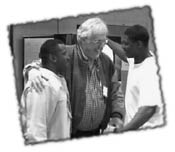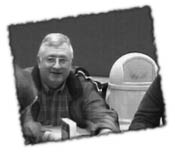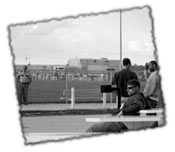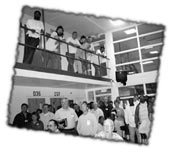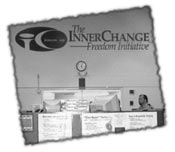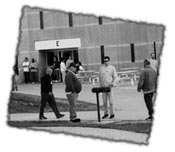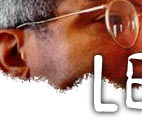



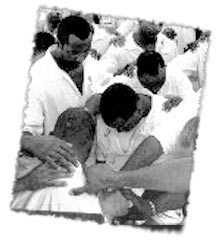 Doing
Good, While Doing Time Doing
Good, While Doing Time
Santorum says a year ago, this would not have been possible:
What we're doing is having a national debate and we're talking about the role of faith in our society, and we're talking about the role of each individual's obligation to those who are less fortunate than us. That is, in and of itself, a wonderful accomplishment of this initiative.
At the heart of Bush's Faith Based Initiative is an effort to expand something called "Charitable Choice," which allows churches and other religious organizations to compete for federal dollars. Congress approved a limited "Charitable Choice" bill in 1996. Current proposals would expand that effort and divert what could eventually add up to billions of federal dollars to religious programs. Supporters like Tom Delay, one of the Republican strongmen in the House, say the idea is both fair and overdue. We now have a President and a Congress who recognize that groups of people all across the country are harnessing the power of faith to solve pressing challenges within our society. It is wrong for the government to discriminate against organizations that can effectively provide services just because those organizations happen to be religious.
religious conversion with helping him overcome a drinking problem, and he has put federal support of religious- based social programs among his top domestic policy priorities. In his commencement address to the University of Notre Dame, on May 20, 2001, the president said we must go beyond government programs and fight poverty now with "the weapons of spirit."
The "War on Poverty" established a federal commitment to the poor. The welfare reform legislation of 1996 made that commitment more effective. For the task ahead, we must move to the third stage of combating poverty in America. Our society must enlist, equip, and empower idealistic Americans in the works of compassion that only they can provide. In the shadow of the Capitol dome, less than a block away from the site of the Faith- Based Summit, a different group of activists and lawmakers gathers to sound an alarm. Among them is New York Congressman Jerry Nadler.
For those who thought our Constitution was secure, think again. We are entering a very dangerous time. The wall of separation between government and religion exists not to protect government from religion, but to protect religion from government and to protect the individual rights of everyone.
Since the 1960's you haven't been able to do that, but here we are discussing publicly funded employment discrimination. It is insulting to suggest that we will not invest in our inner cities unless we go along with this erosion of our civil rights. In one sense what's being proposed here is not new. Every year millions of federal dollars flow to religiously affiliated organizations, from Catholic Charities to Lutheran Social Services, and hundreds of smaller programs. To get that money, they have to follow certain rules. For example, they can only spend it on non-religious purposes and they can't use it to proselytize. Reverend Barry Lynn, who heads Americans United for the Separation of Church and State, says keeping church and state at arm's length from one another is not just important in theory; it's important in practice: If we're going to maintain the integrity of the church, then we don't want the government unduly regulating the church, on the other hand, we can't allow the government to pick and choose among religions or to fund those religious groups that are doing the things the government wants.Republican Congressman J. C. Watts of Oklahoma calls such concerns "red herrings." Along with Democrat Tony Hall of Ohio, Watts is sponsoring legislation to expand Charitable Choice and says his critics are being inconsistent.
This Faith-Based Summit and the Congressional hearings that followed began a debate about how best to reach Americans in need and whether the government should invest directly in the churches to do that. Across the country, advocates of "faith-based" social programs say they often deliver successful results where secular programs fail. By opening the door to religion, they contend, they open the hearts of men and women to such core values as morality, compassion, love, and positive change. Supporters of this approach, including President Bush, often point to the InnerChange program in Iowa as an example of just what they mean. Early in the afternoon, in a medium-security prison in Newton, about thirty miles east of Des Moines, some two-hundred men from Cellblock E gather for their daily community meeting. Most of them wear prison-issued jeans and blue shirts. Each carries a Bible. One man stands up, thrusts his Bible over his head and declares, "This is my Bible…" and the meeting begins.
Sam Dye directs the InnerChange program here in the Newton Correctional Facility, and says the effort is to change people from the inside: "Correction depends upon an external force in order to mold behavior a certain way. The problem with that is that it's like the little kid who was told to sit in the corner and he said I'm sitting down on the outside, but I'm standing up on the inside." He says the proof is in what happens when you withdraw the external force. "We believe that God can change a person's heart and put within him the motivation and the ability to be a different person." Inmates here sign up for a kind of monastic experience for 18 months. Their days begin at dawn with Bible study. There's no television, only Christian videos. Smoking, cursing, and secular music are out. Bible classes, homework, and choir practice are in. Aaron Ganfield is twenty-five, tall, blond, and just two years into a fifty-year sentence for carrying a gun and selling drugs. He says this program "allows you to feel that you're worth something, it gives you hope that change is possible, and that you can be somebody different. Hey, you're not just some convict."
Ganfield wears a cloth bracelet with the letters W-W-J-D, for "What would Jesus do?" One night, he says, at a religious revival meeting here, a preacher urged inmates to own up to their crimes. "I fought my time. In fact I knew I was facing fifty years, and I knew I was guilty of what I did, and it seemed like the guy speaking that night was talking directly to me. He talked about being open and honest, and not being deceitful. Finally, I wrote a letter to Judge Fister, and said, 'Your honor, when I was in your court room, I was deceitful and I lied to you.'" He says coming clean was a relief. "It allowed me to let go of the struggle, the worry, the anxiousness, and the disappointment." Another thing Ganfield gave up was his right to pursue any further legal appeals. Corrections officials point to these confessions, in which men are dropping their appeals and accepting their sentences, as evidence that this program really does change people. Another inmate who confessed said he did so because he couldn't continue to lie and "be part of God's work." Prison officials asked that we not use his real name out of respect for the victims of his crime, so we'll call him Mike. Mike has bright blue eyes, red hair, and a freckled boyish face. He says 13 years ago he was like one of those teenage shooters at Columbine High School in Colorado. One day he woke up and knew he was going to kill.
At the time I was - what do you call it - a maladjusted teenager, and that got to the point where I was getting really angry at things. Basically I took all my problems and anger and focused them on my stepmother and stabbed her to death. It took hours, probably, but it seemed like seconds because there's multiple stab wounds. When I saw what I had done I tried to cover it up. I set the house on fire and then I got scared of all that stuff and I went to my step-grandfather's house and told him the house was on fire and we needed help and that my stepmother was inside. Mike was 16 at the time and now faces life in prison without
parole. For 13 years he denied his guilt, but this past year he
decided to confess. He told his mother and his father, whose wife
he so brutally murdered. He says they forgave him, and he seems
unbothered, even serene about his past and his future. I have something to offer other people now. I can tell them the truth and I can help guide them to the correct answer… It's Christ. It's the fact that no matter how much you've done wrong, there' s a chance to change by forgiveness and the grace of God, you can be a new creation, you can be new. You can be a man who didn't commit murder. When InnerChange first came to the Newton Correctional Facility there was lots of skepticism. Many corrections officials called Cellblock E, "the God pod." One state legislator asked when the Kool-Aid would be served - a reference to the brainwashing and mass suicide of the followers of Jim Jones. But after almost two years, prison officials have come around. Among them is counselor Joe Kent, who now supports the program, although he says InnerChange can't help everyone. He says an inmate must be ready to change before he will really benefit from the program:
If a guy's still in rebellion against authority, then chances are he's not going to change. But, you know we really don't want to get into the habit of saying this guy is going to change, this guy isn't. Probably the best thing to do is to suspend that sort of judgment, you know and take an "only time will tell" approach to it. Kent says a key component is the network of church-based volunteers, who come to the prison to offer Bible-study and mentoring, and who follow these men after they're released. They'll help them land jobs, and welcome them into their church communities. Advocates of InnerChange say this program works where secular programs fail. Recidivism is a national problem: about 40 percent of prison inmates end up back in jail within three years of being released. Compare that to InnerChange. National operations director Jack Cowley says, of the first hundred or so inmates who went through the first InnerChange program in Texas, only six have landed back in jail. That's a rearrest rate of just 6 percent. Cowley says it's the religion that makes the difference. Reverend Barry Lynn of Americans United for Separation of Church and State is among those who disagree. He says he suspects it's the care and attention these inmates get that makes the difference. The reason recidivism rates are down in some programs run by religious organizations is far more likely because those institutions also help people get jobs when they get out of prison. They give more quality time with community members, including with the families of prisoners, while those prisoners are incarcerated. You have to look at all of those factors before you can determine that the real factor is memorizing Bible verses. Right now, InnerChange receives about 40 percent of its funding from the state, which pays for the secular parts of the program, such as drug counseling and job training. The religious instruction is supported with private funds. Even with such divisions in place, critics like Lynn worry that this amounts to government-funded proselytizing, and that it fails to respect the religious identities of all the inmates. Jack Cowley of InnerChange responds by saying that they take anyone in the program, and "they do not have to have a conversion experience in order for us to follow them with our resources once they're out." He says they are not forcing inmates to be Christian, "but you sure have to act like one." Cowley and other advocates say the reult of federal support for faith-based initiatives would be more programs like InnerChange and better protection of the public. They argue that even if these programs blur the line between church and state, the results are worth it. Meanwhile, skeptics ask for research to prove that these programs work. Mark Chaves, professor of sociology at the University of Arizona, says it's not known whether these programs are any better than others. He says the remarkably low number of re-arrests might have more to do with who participates in InnerChange, than with the program itself. "Are those spectacular numbers because they get a spectacular kind of inmate to participate and finish the program?" He says ideally, research would randomly assign some of the prison population to this kind of program and others to a secular rehabilitation program and then compare recidivism rates. Officials at InnerChange say they don't "cherry pick" those they're willing to help. But they do reject some applicants, and they do expel some participants, which Chaves says could skew the numbers. In his view, what little empirical research exists on the effectiveness of pervasively religious social programs is inconclusive. Critics say those who would steer federal dollars to faith-based initiatives have been quick to seize on a few pieces of anecdotal evidence, but have yet to make a convincing case it would be money well spent. Back in Cellblock E, inmates don't discuss the need for empirical research; they do talk about how InnerChange has helped them. Bruce Williamson is here on a two-year drug sentence. "It's offered me a chance that I didn't know I had before. Actually, it's offered me the start of a whole new life."
|
|||||||||||||


